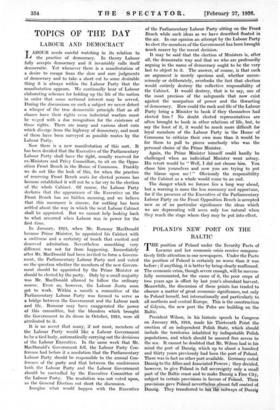TOPICS OF THE DAY
LABOUR AND DEMOCRACY
LABOUR needs careful watching in its relation to the practice of democracy. In theory Labour fully accepts democracy and it invariably calls itself democratic. Yet whenever there is a manifestation of a desire to escape from the slow and sure judgments of democracy and to take a short cut to some desirable thing it is always within the Labour Party that the manifestation appears. We continually hear of Labour elaborating schemes for holding up the life of the nation in order that some sectional interest may be served. During the discussions on such a subject we never detect a whisper of the true democratic principle that as all classes have their rights even industrial warfare must be waged with a due recognition for the existence of those rights. There are many and various short cuts which diverge from the highway of democracy, and most of them have been surveyed as possible routes by the Labour Party.
Now there is a new manifestation of this sort. It has been decided that the Executive of the Parliamentary Labour Party shall have the right, usually reserved for ex-Ministers and Privy Councillors, to sit on the Oppo- sition Front Bench in the House of Commons. Frankly we do not like the look of this, for when the practice of reserving Front Bench seats for elected persons has become established it will not be a far cry to the election of the whole Cabinet. Of course, the Labour Party declares that the appearance of the Executive on the Front Bench has no hidden meaning, and we believe that this assurance is sincere, for nothing has been settled about the way in which the next Labour Cabinet shall be appointed. But we cannot help looking back to what occurred when Labour was in power for the first time.
In January, 1924, when Mr. Ramsay MacDonald became Prime Minister, he appointed his Cabinet with a swiftness and a certainty of touch that excited and deserved admiration. Nevertheless something very different was not far from happening. Immediately after Mr. MacDonald had been invited to form a Govern- ment, the Parliamentary Labour Party met and voted on the question whether the members of the new Govern- ment should be appointed by the Prime Minister or should be elected by the party. Only by a small majority was Mr. MacDonald allowed to follow the ordinary course. Even so, however, the Labour Junta soon got to work. Within a month a committee of the Parliamentary Labour Party was formed to serve as a bridge between the Government and the Labour rank and file. Rumour may have exaggerated the power of this committee, but the blunders which brought the Government to its doom in October, 1924, were all attributed to it.
It is no secret that many, if not most, members of the Labour Party would like a Labour Government to be a tied body, automatically carrying out the decisions of the Labour Executive. In the same week that Mr. MacDonald's Government fell, the Labour Party Con- ference had before it a resolution that the Parliamentary Labour Party, should be responsible to the annual Con- ference of the party and that between the conferences both the Labour Party and the Labour Government should be controlled by the Executive Committee of the Labour Party. The resolution was not voted upon, as the General Election cut short the discussion.
Imagine what would happen with • the Executive of the Parliamentary Labour Party sitting on the Front Bench while such ideas as we have described floated in the -air. In our opinion an attempt by the Labour Party to elect the members of the Government has been brought much nearer by the recent decision.
It may be said that the election of Ministers is, after all, the democratic way and that we who are professedly arguing in the name of democracy ought to be the very last to object to it. The answer, of course, is that such an argument is merely specious and, whether uncon- sciously or deliberately, overlooks the fact that election would entirely destroy the collective responsibility of the Cabinet. It would destroy, that is to say, one of the most precious of the safeguards that now exist against the usurpation of power and the thwarting of democracy. How could the rank and file of the Labour Party bring a Minister to book if they themselves had elected him ? No doubt elected representatives are often brought to book in other relations of life, but, to say the least of it, it would be much more 'difficult for loyal members of the Labour Party in the House of Commons to criticize their own man than it would be for them to pull to pieces somebody who was the personal choice of the Prime Minister.
Again, the Prime Minister himself could hardly be challenged when an individual Minister went astray. His retort would be " Well, I did not choose him. You chose him yourselves and now you are trying to put the blame upon me ! " Obviously the responsibility of the Cabinet as a whole would come to an end.
The danger which we foresee lies a long way ahead, but a warning is none the less necessary and opportune, for if the presence of the Executive of the Parliamentary Labour Party on the Front Opposition Bench is accepted now as of no particular significance the ideas which we are deprecating will seem only too natural when they reach the stage where they may be put into effect.






















































 Previous page
Previous page